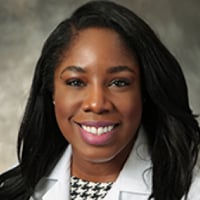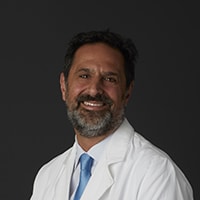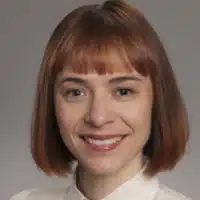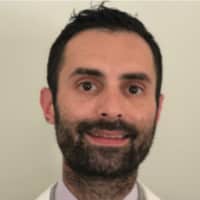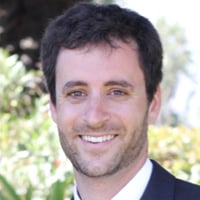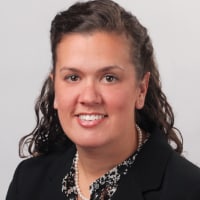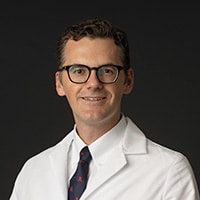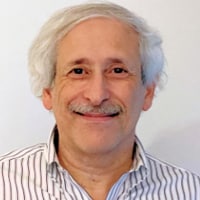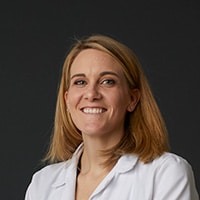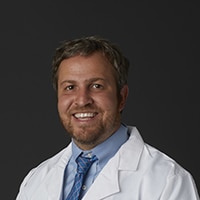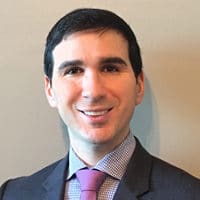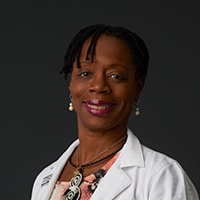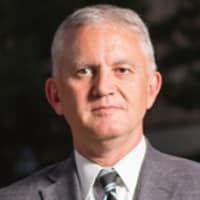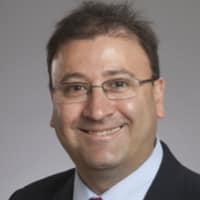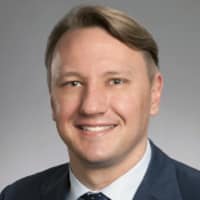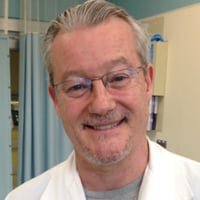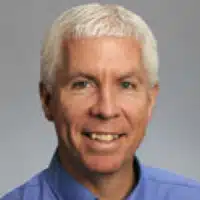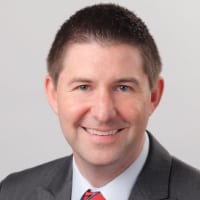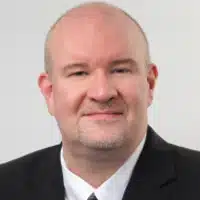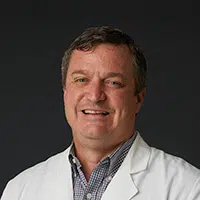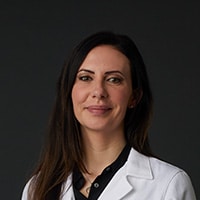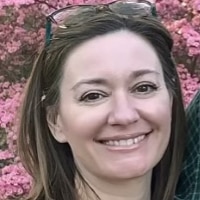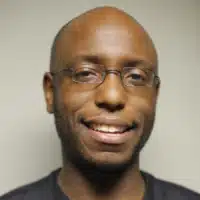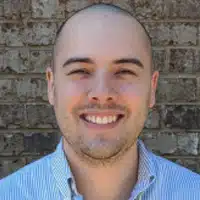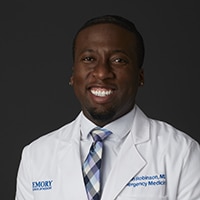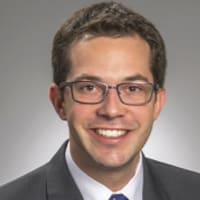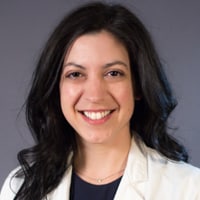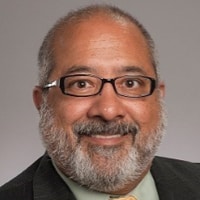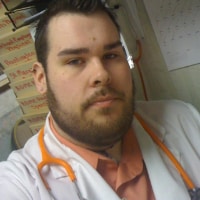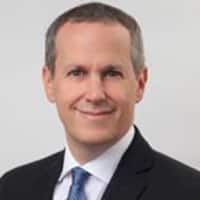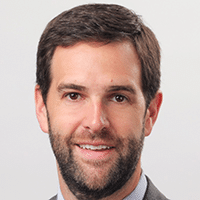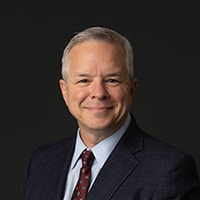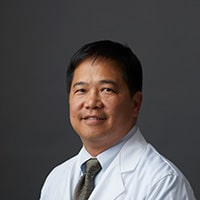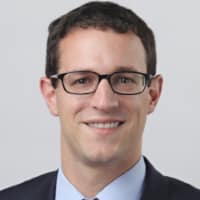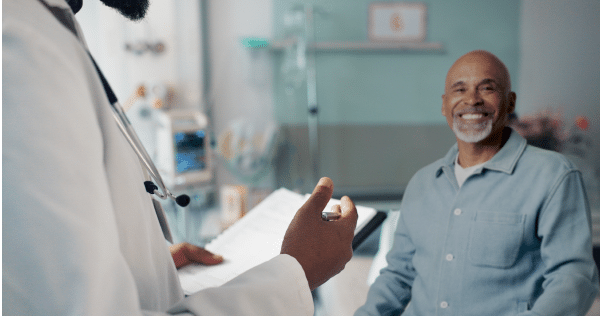Emergency Care Center

Atlanta's Best Emergency Care
No one in Atlanta handles medical emergencies better than Grady. We offer Atlanta’s best, most comprehensive emergency and trauma care.
Our Emergency Department is the most experienced in Georgia, handling more than 150,000 emergency room visits each year which makes us one of the busiest ERs in the world. It’s also the gateway to Atlanta’s premier and only nationally-verified Level I trauma center.
Our nationally acclaimed, specially-trained physicians, nurses and other staff can diagnose and treat every emergency condition, from a traumatic injury to any medical problem that is life threatening or poses a risk of permanent injury if not treated quickly.
Why Choose Us
Simply put, Grady operates one of the nation’s best emergency departments.
Our emergency medical staff is an experienced multidisciplinary team skilled in treating urgent medical conditions. Grady emergency medicine specialists serve on the faculties of Emory and Morehouse schools of medicine. And they are backed up by experts in every field of medicine, using Atlanta’s newest medical technology to diagnose and care for patients. We operate one of the nation’s newest emergency medicine facilities, which was designed by the architect who literally wrote the book on emergency department design.
And, because Grady has one of the nation’s most active emergency medical research programs, we offer access to some of the most promising emerging treatments.
At Grady, every patient we treat benefits from the comprehensive medical services we’ve created for Atlanta over more than 125 years. That means we have the expertise to handle whatever emergency you’re experiencing and whatever complications may arise.
What We Treat
At Grady, we begin to assess patient need as soon as someone walks through the emergency department door and speaks with an advanced care provider.
But treatment can begin even before patients arrive. As soon as a Grady Emergency Medical Services ambulance reaches a patient, trained emergency medical technicians and paramedics consult with our emergency medical staff to triage patients and stabilize them for transport
While 3 percent of emergency department patients suffer from trauma injuries, we handle virtually every type of illness or condition that requires emergency medical attention. This is a sample of the kinds of emergencies we commonly treat:
Sudden abdominal pain or pain accompanied by nausea could be serious. Immediately come to the Grady emergency department for assessment and care.
Chest pain can be caused by many different problems. Because chest pain can indicate a more serious problem, it’s important to seek immediate medical help.
If you are hurt in a fall or accident, immediately visit our emergency department for examination and treatment. If your injury involves a fracture, we can deliver immediate care, then arrange ongoing access with a Grady specialist who can provide the long-term medical care you need.
We can help to reduce the pain and discomfort associated with kidney and gall stones.
Seizures occur with changes in the brain’s electrical activity and most require emergency medical attention. Whether they are caused by trauma like a head injury, brain aneurysm, heat emergency or some other condition, Grady emergency department is staffed and equipped to provide state-of-the-art care quickly.
If you are a victim of a sexual assault, Grady’s Rape Crisis Center offers services to survivors, support to family members, and educational programs to the community.
The Rape Crisis Center offers no-cost services to anyone seeking to heal from sexual violence. Through education and advocacy, we aim to increase awareness of sexual assault, encourage support for survivors, and prevent sex crimes in our community. Our staff creates a safe, supportive, confidential environment where survivors of any race, gender, sexual orientation, and gender identity or expression are welcome and supported.
Our crisis hotline is available 24/7 to provide information, support, and referrals. Please call (404) 616-4861 to connect with a crisis response team member.
Seek emergency care if you experience severe shortness of breath that comes on suddenly and affects your ability to function – especially if it is accompanied by chest pain, fainting or nausea, as these may be signs of a heart attack or pulmonary embolism.
If you or someone near you experiences any symptoms of stroke, call 911 immediately. Even if the symptoms seem minor, don’t hesitate. Failure to call for emergency help can affect the chances for recovery or even survival.
Think you are having a stroke? Call 9-1-1 immediately and insist to be taken to Grady!
F.A.S.T. is an easy way to remember the sudden signs of stroke. When you can spot the signs, you need to call 9-1-1 for help right away. F.A.S.T. is:
- Face Drooping – Does one side of the face droop or is it numb? Ask the person to smile. Is the person’s smile uneven?
- Arm Weakness – Is one arm weak or numb? Ask the person to raise both arms. Does one arm drift downward?
- Speech Difficulty – Is speech slurred? Is the person unable to speak or hard to understand? Ask the person to repeat a simple sentence, like “The sky is blue.” Is the sentence repeated correctly?
- Time to call 9-1-1 – If someone shows any of these symptoms, even if the symptoms go away, call 9-1-1 and get the person to the hospital immediately. Check the time so you’ll know when the first symptoms appeared.
The symptoms of high blood sugar can include nausea, stomach pain and fatigue. If you have Type 2 diabetes and begin experiencing these issues, seek emergency help immediately.
Locations and Directions
Grady Memorial Hospital
80 Jesse Hill Jr Drive SE
Atlanta, GA 30303
24 hours a day, 365 days a year
(404) 616-1000 (Main)
(404) 616-1000 (Appointments)
Parking is available
Public Transportation
- Georgia State Station (0.5 Miles)
Non-Emergency Alternatives
Grady Emergency Department prioritizes patients according to the urgency of their medical conditions. Those whose lives or long-term health are at risk will be treated before patients whose ailments are less serious.
However, this means less critical patients who are experiencing serious discomfort may be forced to wait. If you’re considering an emergency room visit to deal with a chronic condition or suddenly aggravated pain, there may be alternative ways to get the prompt medical attention you want. Grady offers other ways to access care quickly without visiting the emergency room:
Grady Walk-in Center
The Walk-in Center, 56 Jesse Hill Jr. Drive SE, can diagnose, treat and manage your acute medical conditions and minor traumas when you don’t need emergency medical care. The center does not accept appointments, so your wait will depend on the number of patients and the severity of their conditions. You will be seen as soon as possible. It is open Mondays through Fridays, from 7 a.m. to 9 p.m. See Location.
Camp Creek Comprehensive Care Center
The Center, 56 Jesse Hill Jr. Drive SE, offers walk-in convenience care six days a week. They can diagnose, treat and manage your acute medical conditions and minor traumas when you don’t need emergency medical care. Convenience care does not accept appointments, so your wait will depend on the number of patients and the severity of their conditions. You will be seen as soon as possible. It is open Monday through Friday, from 7 a.m. to 5 p.m. and Saturday, from 8 a.m. to noon. See Location.
Grady Neighborhood Centers
Grady’s five neighborhood centers all reserve same-day appointment times for walk-in visitors who seek prompt medical attention. Primary care physicians at each center can treat most aches, pains, and minor injuries. They are particularly well suited to treat chronic conditions like high blood pressure, high cholesterol, diabetes, and asthma. Open Monday through Friday, from 7:30 a.m. to 4:30 p.m., these centers offer medical care convenient to your home. See Locations.
Grady Advice Nurse
The Advice Nurse is available to existing Grady patients 24 hours a day, seven days a week to help them access the healthcare services they need. Specially trained registered nurses answer patient questions and offer recommendations for alleviating pain, relieving cold, flu and asthma symptoms and dealing with other medical issues. They are supported by Grady doctors who are on call to provide care advice. Call (404) 616-0600.
Facilities
The new Grady Emergency Department was designed to provide state-of-the-art care in a setting that can accommodate patients and their loved ones. The Grady Emergency Department center has 109 dedicated rooms to accommodate any emergency situation imaginable, including:
The Clinical Decision Unit is reserved for patients who require observation before being admitted or discharged.
Patients who can walk and sit up tend to require less critical care. Our Zone One area focuses on providing them the fastest treatment possible. This isolates them from patients who require more comprehensive care and those who are more critically ill.
Zones Two and Three treat patients who require more acute care.
To accommodate sickle cell disease patients, Grady has a separate Sickle Cell Emergency Department that specializes in caring for these patients. We treat about 4,000 sickle cell emergencies each year. Because of Grady’s work with this condition, sickle cell patients in Atlanta tend to live longer than in other parts of the nation.
Grady operates the region’s only 24/7 Psychiatric Emergency Services and Crisis Stabilization Unit. This closed unit enables us to conduct medical evaluations for the behavioral patients who need it in addition to their mental healthcare.
Simply put, no one in Atlanta has better diagnostic technology in their emergency room than Grady. And, no hospital staff is more experienced at using it. Consider what we have:
- 256-slice computerized tomography scanner can produce a detailed image of a person’s head in less than a minute – critical in medical emergencies where time will make the difference between caring for a patient and restoring their active lives.
- Four digital x-ray machines in the Emergency Department to quickly diagnose injuries and assess the severity of fractures.
Grady operates an emergency department lab to process diagnostic tests 24 hours a day, seven days a week. The lab can handle anything from the simplest blood tests to more complex analyses
Support Services
Emergencies can take a serious toll on both patients and their families. To provide support through this difficult time, we offer:
- Three dedicated family rooms, available to loved ones of patients who are gravely ill.
- Interpreters to make sure patients and their family members communicate effectively with medical staff.
- 24-hour chapel services to address the spiritual needs of patients and their families.
- 24-hour social workers to help you manage the non-medical issues of emergency care, from transportation to financial services.
- Chaplains to address the spiritual needs of patients and their families.
Learn more about our patient and visitor services.
Research
As one of the nation’s elite teaching hospitals, our emergency clinicians have been involved in countless studies aimed at finding better, more effective treatments for emergency patients. Research conducted at Grady has helped to redefine the way doctors around the world treat emergency medical conditions. This commitment to research means that Grady offers the best standard emergency care – and the best emerging care. The benefit to patients is clear: They have access to treatment options unavailable at most other institutions.
Grady Stories
Our Doctors
Every hospital treats patients. At Grady, we strive to treat them better, more efficiently and more effectively. Our emergency department is staffed by physicians, nurses, and other staff specialized in treating conditions that require immediate care – no matter what the time of day or day of the year. This mission to care for all who need us attracts physicians from across the nation who are drawn to Grady because we test the limits of medicine through innovation and research.
When you arrive at the Emergency Department entrance, an advanced practice provider will see you to begin the triage process. Most emergency department front-line staff members are nurses. An advanced practice provider has more training to help identify issues that a patient faces. Their evaluation helps to make sure patients get the attention they need as quickly as possible.
Our zeal for innovation has given Grady a national reputation for medical advances in emergency medicine, trauma care, burns, stroke, diabetes, infectious diseases, women’s health, sickle cell, and other conditions treated by specialists in our centers of excellence. Access to all of these accredited practices is available to every Grady patient and our collegial environment means that specialists routinely help to care for their colleagues’ patients.
Though clinicians are drawn by Grady’s reputation, most are employed by the Emory and Morehouse schools of medicine, which staff our medical services. Grady is one of a handful of U.S. health systems whose patients are cared for by faculty members of two medical schools. This reinforces our commitment to ongoing innovation.
Emergency Medicine
Internal Medicine
Emergency Medicine
Emergency Medicine
Emergency Medicine, Emergency Medical Services
Emergency Medicine
Emergency Medicine, Medical Toxicology
Emergency Medicine
Emergency Medicine, Medical Toxicology
Emergency Medicine
Emergency Medicine
Emergency Medicine
Chief of Pediatrics, Georgia Poison Center Medical Director
Emergency Medicine
Emergency Medicine, Medical Toxicology
Emergency Medicine
Diagnostic Radiology
Diagnostic Radiology
Emergency Medicine
Emergency Medicine
Emergency Medicine, Emergency Medical Services
Emergency Medicine, Emergency Medical Services
Emergency Medicine, Medical Toxicology
Emergency Medicine, Emergency Medical Services
Emergency Medicine
Emergency Medicine
Emergency Medicine
Emergency Medicine
Emergency Medicine
Emergency Medicine, Internal Medicine
Emergency Medicine
Emergency Medicine, Medical Toxicology
Emergency Medicine
Emergency Medicine
Emergency Medicine
Emergency Medicine
Emergency Medicine, Medical Toxicology
Emergency Medicine
Critical Care Medicine, Emergency Medicine
Emergency Medicine
Emergency Medicine, Internal Medicine
Emergency Medicine, Critical Care Medicine
Emergency Medicine
Emergency Medicine
Emergency Medicine
Emergency Medicine
Emergency Medicine, Emergency Medical Services
Emergency Medicine
Pediatric Radiology
Emergency Medicine
Emergency Medicine
Emergency Medicine
Emergency Medicine
Emergency Medicine
Emergency Medicine
Emergency Medicine
Emergency Medicine, Medical Toxicology
Emergency Medicine, Critical Care Medicine
Emergency Medicine, Medical Toxicology
Emergency Medicine
Emergency Medicine
Emergency Medicine
Associate Medical Director - Emergency Care Center; Medical Director - Urgent Care Center; Medical Director - Clinical Decision Unit
Emergency Medicine
Emergency Medicine, Medical Toxicology
Emergency Medicine
Chair of Emergency Medicine
Emergency Medicine, Preventive Medicine
Emergency Medicine
Emergency Medicine


